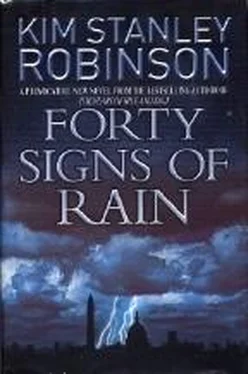Their pilot maneuvered them farther south. They were going to pass the Washington Monument on its south side. They puttered slowly past it. It towered over them like an obelisk in the Nile’s flood, making all the watercraft look correspondingly tiny.
The Smithsonian buildings appeared to be drowned to about ten feet. Upper halves of their big public doors emerged from the water like low boathouse doors. For some of the buildings that would be a catastrophe. Others had steps, or stood higher on their foundations. A mess any way you looked at it.
Their launch growled west at a walking pace. Trees flanking the western half of the Mall looked like water shrubs in the distance. The Vietnam Memorial would of course be submerged. The Lincoln Memorial stood on its own pedestal hill, but it was right on the Potomac, and might be submerged to the height of all its steps; the statue of Lincoln might even be getting his feet wet. Charlie found it hard to tell, through the strangely shortened trees, just how high the water was down there.
Boats of all kinds dotted the long brown lake, headed this way and that. The little blue pedal boats from the Tidal Basin were particularly festive, but all the kayaks and rowboats and inflatables added their dots of neon color, and the little sailboats tacking back and forth flashed their triangular sails. The brilliant sunlight filled the clouds and the blue sky. The festival mood was expressed even by what people wore—Charlie saw Hawaiian shirts, bathing suits, even Carnival masks. There were many more black faces than Charlie was used to seeing on the Mall. It looked as if something like Trinidad’s Mardi Gras parade had been disrupted by a night of storms, but was reemerging triumphant in the new day. People were waving to one another, shouting things (the helicopters overhead were loud); standing in boats in unsafe postures, turning in precarious circles to shoot three-sixties with cameras. It would only take a water skier to complete the scene.
Charlie moved to the bow of the launch, and stood there soaking it all in. His mouth hung open like a dog’s. The effort of getting out the window had reinflamed his chest and arms; now he stood there on fire, torching in the wind, drinking in the maritime vision. Their boat chugged west like a vaporetto on Venice’s broad lagoon. He could not help but laugh.
“Maybe they should keep it this way,” someone said.
A Navy river cruiser came growling over the Potomac toward them, throwing up a white bow wave on its upstream side. When it reached the Mall it slipped through a gap in the cherry trees, cut back on its engines, settled down in the water, continued east at a more sedate pace. It was going to pass pretty close by them, and Charlie felt their own launch slow down as well.
Then he spotted a familiar face among the people standing in the bow of the patrol boat. It was Phil Chase, waving to the boats he passed like the grand marshal of a parade, leaning over the front rail to shout greetings. Like a lot of other people on the water that morning, he had the happy look of someone who had already lit out for the territory.
Charlie waved with both arms, leaning over the side of the launch. They were closing on each other. Charlie cupped his hands around his mouth and shouted as loud as he could.
“HEY PHIL! Phil Chase!”
Phil heard him, looked over, saw him.
“Hey Charlie!” He waved cheerily, then cupped his hands around his mouth too. “Good to see you! Is everyone at the office okay?”
“Yes!”
“Good! That’s good!” Phil straightened up, gestured broadly at the flood. “Isn’t this amazing?”
“Yes! It sure is!” Then the words burst out of Charlie: “So Phil ! Are you going to do something about global warming now ?”
Phil grinned his beautiful grin. “I’ll see what I can do!”
Many thanks for help from Guy Guthridge, Grant Heidrich, Charles Hess, Dick Ill, Chris McKay, Oliver Morton, Lisa Nowell, Ann Russell, Mark Schwartz, Sharon Strauss, and Jim Shea.
A Bantam Spectra Book / June 2004
Published by Bantam Dell a division of Random House, Inc.
New York, New York
This is a work of fiction. Names, characters, places, and incidents either are the product of the author’s imagination or are used fictitiously. Any resemblance to actual persons, living or dead, events, or locales is entirely coincidental.
Copyright © 2004 by Kim Stanley Robinson
All rights reserved. No part of this book may be reproduced or transmitted in any form or by any means, electronic or mechanical, including photocopying, recording, or by any information storage and retrieval system, without the written permission of the Publisher, except where permitted by law.
Bantam Books® is a registered trademark of Random House, Inc., and the colophon is a trademark of Random House, Inc.
Visit our website at
www.bantamdell.com
Library of Congress Cataloging in Publication Data
Robinson, Kim Stanley.
Forty signs of rain / Kim Stanley Robinson.
p. cm.
eISBN 0-553-89817-5
1. Scientists—Fiction. 2. Legislators—Fiction. 3. Washington (D.C.)—Fiction. 4. Business intelligence—Fiction. I. Title.
PS3568.O2893F67 2004 2003063683
Конец ознакомительного отрывка
Купить книгу












